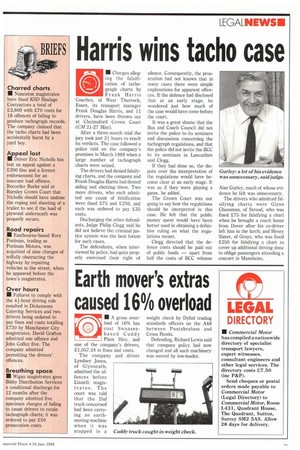Harris wins tacho case
Page 17

If you've noticed an error in this article please click here to report it so we can fix it.
• Charges alleging the falsification of tachograph charts by Frank Harris Coaches, of West Thurrock, Essex, its transport manager Frank Douglas Harris, and 11 drivers, have been thrown out at Chelmsford Crown Court (CM 21-27 May).
After a three-month trial the jury took just 21 hours to reach its verdicts. The case followed a police raid on the company's premises in March 1989 when a large number of tachograph charts were seized.
The drivers had denied falsifying charts, and the company and Frank Douglas Harris had denied aiding and abetting them. Two more drivers, who each admitted one count of falsification were fined £75 and £250, and each was ordered to pay £35 costs.
Discharging the other defendants, Judge Philip Clegg said he did not believe the criminal justice system was the best forum for such cases.
The defendants, when interviewed by police, had quite properly exercised their right of silence. Consequently, the prosecution had not known that in many cases there were simple explanations for apparent offences. If the defence had disclosed that at an early stage, he wondered just how much of the case would have come before the court.
It was a great shame that the Bus and Coach Council did not invite the police to its seminars and discussions concerning the tachograph regulations, and that the police did not invite the BCC to its seminars in Lancashire said Clegg.
If they had done so, the dispute over the interpretation of the regulations would have become clear at an early stage. It was as if they were playing a game, he added.
The Crown Court was not going to say how the regulations should be interpreted in this case. He felt that the public money spent would have been better used in obtaining a definitive ruling on what the regulations meant.
Clegg directed that the defence costs should be paid out of public funds — apart from half the costs of BCC witness Alan Gurley, much of whose evidence he felt was unnecessary.
The drivers who admitted falsifying charts were Glynn Cheesman, of Strood, who was fined £75 for falsifying a chart when he brought a coach home from Dover after his co-driver left him in the lurch; and Henry Slater, of Grays, who was fined £250 for falsifying a chart to cover up additional driving done to oblige passengers attending a concert in Mannheim.














































































































